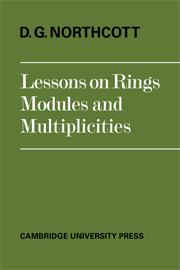Book contents
- Frontmatter
- Contents
- Preface
- Some notes for the reader
- 1 Introduction to some basic ideas
- 2 Prime ideals and primary submodules
- 3 Rings and modules of fractions
- 4 Noetherian rings and modules
- 5 The theory of grade
- 6 Hilbert rings and the Zeros Theorem
- 7 Multiplicity theory
- 8 The Koszul complex
- 9 Filtered rings and modules
- Index
7 - Multiplicity theory
Published online by Cambridge University Press: 09 January 2010
- Frontmatter
- Contents
- Preface
- Some notes for the reader
- 1 Introduction to some basic ideas
- 2 Prime ideals and primary submodules
- 3 Rings and modules of fractions
- 4 Noetherian rings and modules
- 5 The theory of grade
- 6 Hilbert rings and the Zeros Theorem
- 7 Multiplicity theory
- 8 The Koszul complex
- 9 Filtered rings and modules
- Index
Summary
General remarks. This chapter is devoted to the development of a general theory of algebraic multiplicities. This body of results arises directly out of the concept of length which was first encountered in Chapter 1. Since the notion of length does not require the ring of operators to be commutative, it is natural to avoid introducing commutativity into the discussion until a point is reached where its use seems unavoidable. In fact one can go a surprisingly long way before this happens, but first it is necessary to adapt some of the general theorems of commutative algebra to meet the needs of the present situation. The results that require to be generalized are the Artin–Rees Theorem, the Intersection Theorem, and the theory of the Jacobson radical. These are reviewed and re-established in suitably modified forms in section (7.2).
We continue to use the convention that R always denotes a ring with an identity element. Throughout sections (7.8) to (7.10) inclusive it is also assumed that R is commutative, but in none of the remaining sections of the chapter is this condition imposed. Considerable use will be made of some of the results obtained in Chapter 4. Now although Chapter 4 is primarily concerned with the theory of commutative rings, it will be recalled that all the results of section (4.1) are valid in the non-commutative case.
Preliminary considerations
Let R be a ring with an identity element. In what follows, the term R-module will always mean a left R-module.
Information
- Type
- Chapter
- Information
- Lessons on Rings, Modules and Multiplicities , pp. 289 - 350Publisher: Cambridge University PressPrint publication year: 1968
